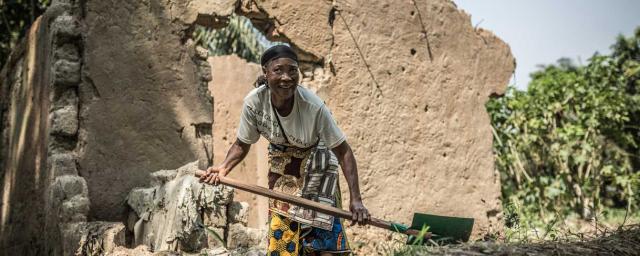
Helleine Kilo returns to the ruins of her home destroyed during the 2015 crisis in the Bloc Sara neighborhood. When security allows, she returns to her former home to clear the weeds. (Photo: Pablo Tosco/Oxfam Intermón)
The Central African Republic (CAR) is a landlocked country in Central Africa, rich in natural resources but plagued by conflict and persistent instability. Since 2013, the country has faced serious humanitarian crises, including violence, mass displacement, and food insecurity.
For the past decade, CAR has been experiencing a multifaceted crisis that has affected all aspects of national life and prevented the country from realizing its potential.
Challenges
Humanitarian Crisis
Ongoing armed conflicts have led to widespread violence, displacing more than a million people internally, and forcing many more to seek refuge in neighboring countries. Approximately 2.8 million people, nearly half of the population, need humanitarian assistance.
Critical WASH needs
An estimated 1.6 million people require urgent access to water, sanitation, and hygiene (WASH) services:
- 25% of the population lacks access to improved water source.
- 68% lack adequate sanitation infrastructure.
- 72% lack handwashing facilities.
The situation is particularly alarming in essential public institutions:
- 39% of health facilities lack adequate access to water.
- Only 38% of schools have a permanent water supply.
Communities face acute food insecurity and lack access to basic services such as water, adequate sanitation, healthcare, and education. There is scope to strengthen local governance, promote community resilience, and enhance collaboration among humanitarian actors to improve living conditions. However, political instability is hampering progress.
Impact on People
The challenges facing CAR disproportionately affect women, children, and marginalized communities. Displacement leads to loss of livelihoods and exacerbates poverty, destruction of WASH infrastructure, food insecurity, and extra-internal community tensions. Children suffer from disrupted education and increased risks of exploitation and abuse. Women face gender-based violence and limited economic opportunities, which only exacerbates cycles of inequality and hardship.
Oxfam’s Role
Oxfam has been working in CAR since 2014, in Bangui, Batangafo, Bria, Paoua, and Bangassou. Our work follows an integrated approach combining Livelihoods and Food Security, WASH, and Protection and Gender. This strategy combines emergency response, such as food assistance, strengthening community protection structures, and WASH emergency response, with recovery activities. These efforts enable populations to regain a degree of autonomy through agricultural revitalization, support for income-generating activities, and the construction of basic infrastructure.
We support the establishment of community structures to foster project ownership, leadership among affected communities, and sustainability. Oxfam also promotes the active participation of civil society in reducing the root causes of conflict and rebuilding state structures within the framework of good governance. Our approach is based on the humanitarian-development-peace nexus, partnership with local actors, and accountability to communities.
Our Work
Our operations are among the largest of the humanitarian and good governance actors in CAR, as well as within Oxfam in Africa. We focus on:
Providing water, sanitation, and hygiene
We help by producing and bringing drinking water to the displacement sites and neighborhoods, as well as by rehabilitating and maintaining the sanitation infrastructure. We also organize hygiene promotion actions.
Ensuring food security and livelihoods
To feed the population and support small local businesses, we distribute foodstuffs and undertake projects of public interest, such as building roads or markets. The local communities receive training, seeds, and equipment, which enables them to feed their families.
Improving protection of the population
We work from the assumption that the foundations of lasting peace are laid at the community level, particularly in a country where the State institutions are fragile, as is the case in CAR. We support Community Protection Committees with raising people’s awareness about their rights and directing victims of sexual and physical violence to appropriate medical or psychological services.
Supporting civil society
To establish peace and sustainable development, we want to give civil society organizations the means of developing and participating in the implementation of national policies. Even in a country where the State institutions are fragile, like CAR, they are sometimes the only ones that can provide basic social services to vulnerable communities.
Promoting the rights of women in conflict situations
We are helping women from civil society set up an advocacy campaign on women's rights in the context of conflict. The goal is to encourage women to assert their right to equal participation in peacebuilding process and promoting security, and to increase their participation in decisions affecting political, public, and private life. Women are most affected by conflicts and are key to lasting peace.
Looking Ahead
Continued efforts are needed to expand access to education and healthcare for marginalized groups, strengthen local governance, and increase funding for food security and protection programs. Promoting economic opportunities for women and marginalized groups will be essential to reducing poverty and inequality and strengthening community resilience in CAR.